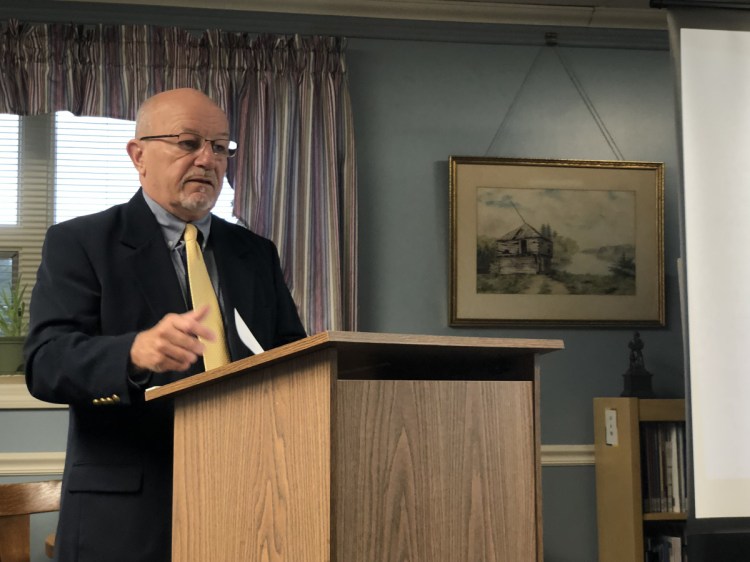WINSLOW — The credibility of American journalism is suffering amid today’s fake news epidemic, but real reporting isn’t dead — at least according to Chet Lunner, who spoke on the topic Thursday night at Winslow Public Library.
The crux of his message was that “the freedom of the press belongs to those who own one,” an idea popularized by New Yorker journalist A.J. Liebling. And now, with the rise of social media platforms such as Facebook and Twitter, nearly anyone in the world can own, effectively, a personal “press.” At the clack of the keys and the click of a button, misinformation can make its way into the world, unvetted. While traditional media outlets follow strict codes of ethics, with editors investigating the legitimacy of information, today’s digital climate often shifts that onus to the public.
“Today the masters of Facebook and Twitter … are only barely waking up to that responsibility,” Lunner said, “partly due to a new sense of responsibility and partly because governments are clearly signaling that if you don’t police your content, Mark Zuckerberg, we will.”
A Pew study reported that two thirds of Americans get their news from social media — a problematic statistic in a world where, for instance, Russia can target ads and videos that reach 146 million Americans, as they did to sway votes around the 2016 election.
Lunner is no stranger to the press, having started his career as a reporter and editor before transitioning to public affairs, which included a stint as chief communications officer at the U.S. Department of Transportation, where he advised on media strategy in the wake of the Sept. 11, 2001, attacks.
In Maine, Lunner held editor roles at the Kennebec Journal, the Biddeford-Saco Journal Tribune and the Portland Evening Express and served as the founding president of Maine’s chapter of the Society of Professional Journalists. He was a national correspondent for Gannett News Service and USA Today in Washington, but he has devoted the past 15 years to the Transportation Security Administration, Department of Homeland Security and — even in retirement — a number of national security consulting and education organizations.
In his days as a local reporter, Lunner cited the experience of sitting across from a town councilor and a police chief at a coffee shop as something that helped hold him accountable for fair reporting — and which is lost in the digital age.
“You learn pretty quickly how powerful the impact is that your words have on other human beings, because they’re sitting right across from you,” he said. “I was held accountable for my words in a very human, person-to-person way. These days, the human connection is gone, and everyone gets their coffee to go.”
The solution to fake news is contingent on citizens regaining trust in American politics and news media. Lunner cited a Readers’ Digest poll that named Walter Cronkite as the “Most Trusted Man in America” in 1966, compared to 2016’s results, in which no media or political figure placed in the top 10, and Tom Hanks replaced Cronkite at the top slot (notably, before he played Ben Bradlee in 2017’s “The Post”).
“I think the answer … is a return to good old fashioned, corny American values,” Lunner noted. “We all need to get back to the basics and practice mutual respect, reach out to others with care when speaking to them or writing about them. Slow down, think before you tweet.”
Another major way to boost trust in these institutions, according to Lunner, is to emphasize the necessity of thinking critically about all information. Teaching critical thinking and analytical skills to students instead of routine curricula designed to boost test results would also make huge strides in creating a better-informed society that is less vulnerable to “weaponized social media.”
Lunner urged readers to actively seek news from a range of sources rather than “echo chambers for your own biases.” He also provided several resources that individuals can use to help evaluate sources and sort fact from fiction. Among these are: the News Media Alliance, Newseum Ed, Politifact, factcheck.org and snopes.com.
“All that Twitters isn’t gold,” Lunner concluded, while displaying an Abraham Lincoln meme reading: “Don’t believe everything you read on the Internet.”
Last evening’s lecture was part of the World in Your Library series, sponsored by the Maine Humanities Council and the Margaret Chase Smith Foundation. This program brings Maine-based experts who can provide deeper context to local and international current events to speak at libraries throughout the state. As of press time, there are no World in Your Library events scheduled at Winslow Public Library for the remainder of the year. A full schedule can be found at mainehumanities.org.
Meg Robbins — 861-9239
Copy the Story LinkSend questions/comments to the editors.



Success. Please wait for the page to reload. If the page does not reload within 5 seconds, please refresh the page.
Enter your email and password to access comments.
Hi, to comment on stories you must . This profile is in addition to your subscription and website login.
Already have a commenting profile? .
Invalid username/password.
Please check your email to confirm and complete your registration.
Only subscribers are eligible to post comments. Please subscribe or login first for digital access. Here’s why.
Use the form below to reset your password. When you've submitted your account email, we will send an email with a reset code.